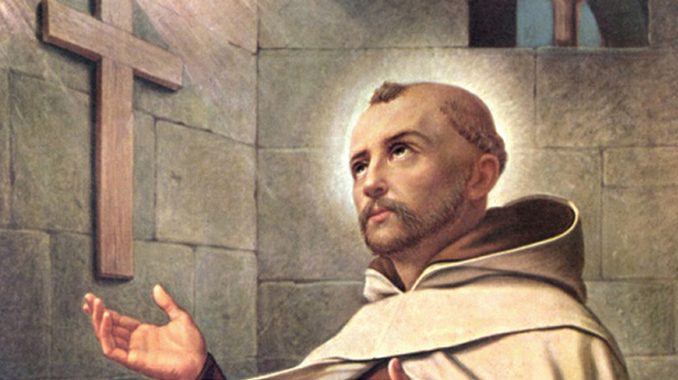By Kevin Bezner
Kevin Bezner is a poet, teacher, and catechist who lives in Charlotte, North Carolina.

If you asked me a few years ago about spiritual desolation I would not have had much of an answer for you.
We all have struggles in our lives, and I’ve had my share of professional and personal difficulties, but I entered an all-time low—a period of spiritual desolation—when the bank where I worked collapsed a few years ago.
In The Spiritual Exercises St. Ignatius of Loyola tells us that desolation is a time of darkness, turmoil, and restlessness. During such times, we tend to be lazy in our prayer, sad, and generally separated from God. This is the opposite state of consolation, when we are full of the love of God and feel joy and peace because we are close to Him.
St. Ignatius explains that the good spirit brings consolation, the evil spirit desolation. The first piece of advice Ignatius offers for dealing with desolation is to avoid any change, since the evil spirit fills us with all types of thoughts about changing our situation. If we give in to the confusion caused by the evil spirit, we fail to make good decisions.
Even though I had gone through the Spiritual Exercises and had even led Ignatian retreats, I did not follow Ignatius’ advice when I most needed it. I was tempted, and I fell.
When the bank I worked for collapsed, everyone I knew was filled with anxiety, just as I was. I had not lost my job, and there was no indication that I would. Still, I remained in a state of inner turmoil. I prayed, attended Mass more frequently, went to counseling and spoke with my spiritual director, yet I could not shake the fear that I was one of those who would lose my job.
I have lived with instability and low wages for much of my life. During the years I worked at the bank, I had both stability and a good income. For the first time in my life, I had savings. I believed that if I lost my job I would lose everything.
Even as I turned to Ignatius and continued to remind myself of the importance of not making any change at work, I spent far too much time listening to the words of the evil spirit who was telling me that I needed to protect myself and should look for work elsewhere. I made a promise that I would accept a new job only if it were better than the job I had. I thought that my self-control would protect me from making a bad decision. It didn’t.
What I thought of as a perfect job emerged. I went through the interview process, but I saw red flags. I prayed and asked God to guide me. Deep in my heart I knew I should pass up the opportunity. Fear and desire took over. I accepted the job and within two months I understood that I had made a terrible mistake. I had not followed the advice of Ignatius that in a time of desolation we should remain in place. My failure thrust me deeper into desolation.
Stuck in a job that was nothing like the description I had received, surrounded by people unhappy that an outsider had been brought in, I made every effort to dig in. I wanted to endure. I saw myself as suffering for Christ. Yet this time I listened to Ignatius and increased my prayer and meditation. I prayed the Liturgy of the Hours daily. I also prayed the Rosary daily. I went to Mass as often as I could. I meditated daily on Scripture. I resisted the turmoil in my life, telling myself that I needed to be patient. Finally, through prayer, I found an answer, one I had not expected.
Ignatius says that there are three reasons God allows desolation: because we have been negligent in prayer, He wishes to test us, or He wants us to come to a true understanding of who we are and how much we depend on Him for His grace and knowledge.
In his book How to Listen When God is Speaking, Fr. Mitch Pacwa reminds us that everyone goes through periods of spiritual desolation. He notes that even Jesus experienced desolation in the form of testing at the end of the forty days He spent fasting in the desert. Since each of us will experience periods of desolation, we need to be prepared for them. Just as athletes train, we too must train so that we can hear God's voice during times of desolation. Regular prayer must hold a central place in our training.
With the commandments, the Our Father, and the beatitudes, Jesus has given us a clear road map for our journey. We are also blessed with the saints and doctors of the Church, who offer further guidance to us in their lives and words about the many obstacles we will encounter on the way, including desolation. In The Fulfillment of All Desire: A Guidebook for the Journey to God Based on the Wisdom of the Saints, Ralph Martin offers excellent advice from various doctors of the Church on how to handle difficulties.
All of the saints teach that spiritual growth is the result of resisting temptations and enduring trials. All teach as well that prayer is essential. It is the same advice St. Ignatius offers in helping us to understand and work through times of desolation. Martin recounts how St. Thérèse, for example, had to learn patience and self-denial in order to conform her will to God’s will. She gained this wisdom through prayer. As these great saints show us, we can achieve a certain peace and stability in our lives. This only comes to us when we cooperate with grace and make efforts to center our life on God—praying, resisting temptations, using wisdom in the choices we make.
When I returned to the home I had left, my troubles did not immediately leave. I had enough savings to carry me through for a few months, and I found a job through an old friend. Within a year, though, I was let go. I struggled, but I also found myself growing spiritually. I heeded St. Ignatius’ advice and even returned to meditating on his exercises. I continually worked on further developing my prayer life. The troubles of my life did not disturb me as they had in the past because of prayer. Guided by saints and doctors of the Church, I am still working to cooperate with God's grace. I am far from holy, but I am headed in the right direction.
You Might Also Like

Ralph Martin's modern classic The Fulfillment of All Desire is a perennial best-seller. Drawing upon the teaching of seven acknowledged Spiritual Doctors of the Church, he presents an in-depth study of the journey to God.